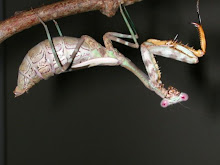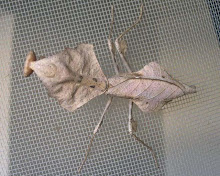The reproductive process in a majority of mantid species is marked by sexual cannibalism of the male by the female, and is an ongoing subject of research. The reason for sexual cannibalism has been the subject of some debate, with some considering submissive males to be achieving a selective advantage in their ability to produce offspring. This theory is supported by a quantifiable increase in the duration of copulation among male mantids who are cannibalized, in some cases doubling both the duration and the chance of fertilization. This is further supported in a study by J. P. Lelito and W. D. Brown where male mantids were seen to approach hungry females with more caution, and were shown to remain mounted on hungry females for a longer time, indicating that males actively avoiding cannibalism may mate with multiple females. The act of dismounting is one of the most dangerous times for male mantids during copulation, for it is at this time that female mantids most frequently cannibalize their mates. This increase in mounting duration was thought to indicate that males would be more prone to wait for an opportune time to dismount from a hungry female rather than from a satiated female that would be less likely to cannibalize its mate. Some consider this to be an indication that male submissiveness does not inherently increase male reproductive success, rather that more fit males are likely to approach a female with caution and escape
skip to main |
skip to sidebar
mantis,carnivorous insect,prayer-like,small insects,fruit flies,aphids,micro crickets,locus,wax worms,Dead Leaf mantis,Tropical,Venezuelan,Boxer mantis,Cameroon,Asian,Tropical shield,Flower,Indian,Twig,Grizzled ,Indo-Pacific,Jumpy,Devil's Flower,Mediterranean,European,South African,Egyptian,Peruvian,Ghost,Malaysian,Arizona ,unicorn,California,Florida,
.jpg)
.jpg)
.jpg)